Follow these guidelines to testify for legislation. You’ll also find tips on parking in Annapolis.
Legislation Sponsored by Senator J.B. Jennings
-

Senate Bill 310 - Criminal Records- Maryland Judiciary Case Search - Traffic Violation by a Minor
Senate Bill 310 is about proteting minors from having their home address accessible on Maryland Judiciary Case Search.
-
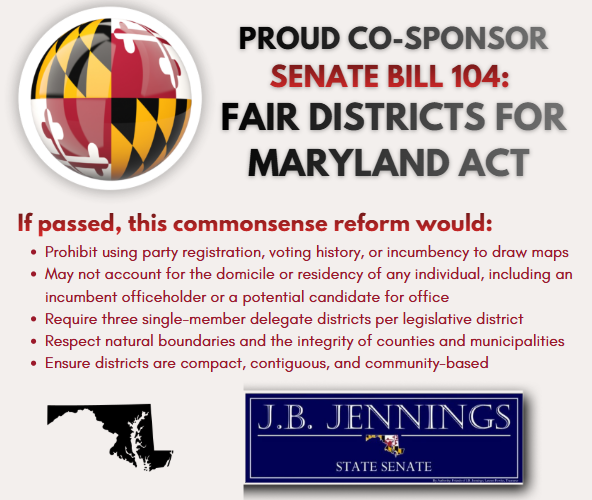
Senate Bill 104 - Fair Districts for Maryland Act
History of Senate Bill 104:
First Reading Senate Rules -

Senate Bill 309 - Sales and Use Tax - Precious Metal Bullion or Coins - Exemption
History of Senate Bill 309
1/22/2026 Hearing 1/28 at 1:00 p.m.
Thank you, to those who testified. I hope this bill will undo some of the damage done to the bullion and coin industry from last year’s legislation.
-

Senate Bill 382 - Retire in Maryland Tax Relief Act
Hearing in Budget & Taxation on 2/11
-

Senate 454
Hearing on February 11, 2026 at 1:00 p.m. in Judicial Proceedings.
To testify, please email jb.jennings@senate.maryland.gov, and my Legislative Director, Rachel, will follow up.
-

Senate Bill 579 - Counties- No Cost Preventative Cancer Screenings for Volunteer Firefighters
This will be heard in Finance
-
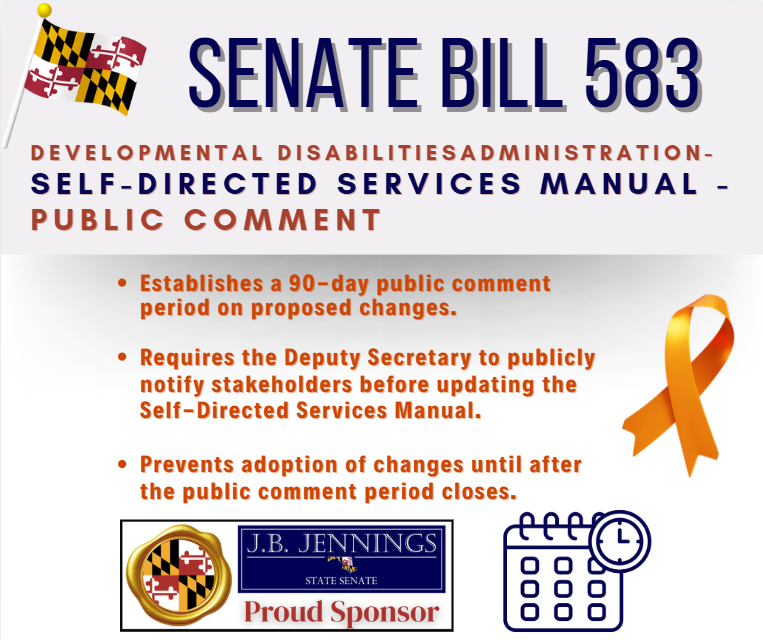
Senate Bill 583
Requiring the Deputy Secretary for Developmental Disabilities to provide notice to the public before making changes to the Self-Directed Services Manual; requiring the Deputy Secretary to receive and consider comments on the proposed changes from the public for at least 90 days after the date on which the notice is provided; and prohibiting the Deputy Secretary from adopting the proposed changes until the public comment period has ended.First Reading in Finance
Sign Up to Testify on Friday, February 20, 2026 by 6:00 p.m. for the Bill Hearing on:
Tuesday, February 24, 2026.
-

Senate Bill 576 - Cooperative Housing Corporations and Condominiums - Emergency Use of Reserve Funds
Providing that reserve funds of a Senate Bill 576 - Cooperative Housing Corporations and Condominiums - Emergency Use of Reserve Funds provides cooperative housing corporations and condominium associations with limited flexibility in times of emergency.
Specifically, it allows reserve funds to be used for purposes outside of the approved funding plan, when necessary, provided that at least two-thirds of members or unit owners vote in favor of the action.
This measure ensures that communities can respond quickly to urgent situations while still maintaining strong accountability through a supermajority approval requirement.
Thank you to the community members who put so much time and heart into this bill!
Sign up today by 6:00 p.m. to testify on Senate Bill 576 at the Judicial Proceedings Committee hearing on Wednesday, February 18, 2026 at 1:00 p.m.
-
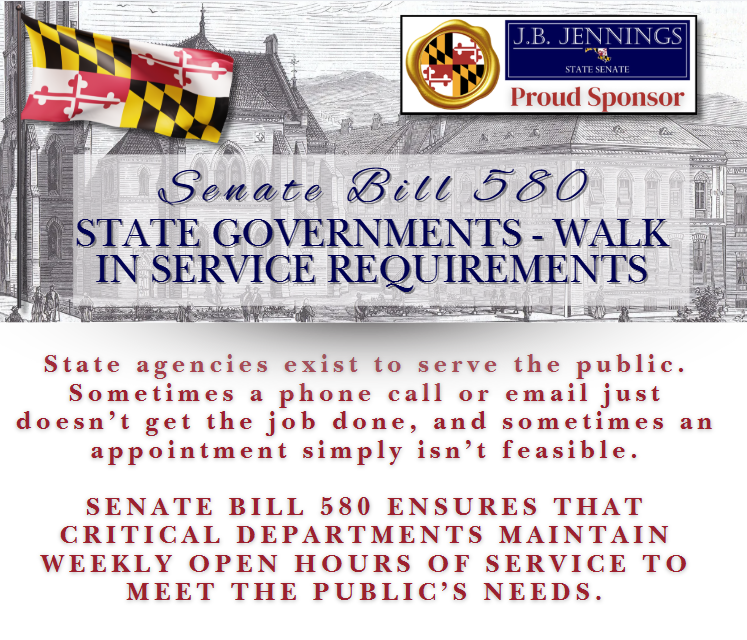
Senate Bill 580 - State Government - Walk-In Service Requirements
Senate Bill 580 would require walk-in hours, at least one day a week, between 10:00 a.m. and 4:00 p.m. at reasonable locations for the following:
Comptroller’s Officer
Department of Aging- Durable and Medical Equipment Re-Use Program
Department of Commerce, Maryland Business Express Program
Department of Labor - Division of Occupational and Professional Licensing
Department of Natural Resources- Licensing and Registration Service Centers
Department of Transportation - Motor Vehicles Administration
Department of Health - Division of Vital Records
Department of Health - Maryland’s Commitment to Veterans Program
Maryland Department of Veterans and Military Families - Service Programs Offices
The MD Health Benefit Exchange
The Public Service Commission - Transportation Division
MD State Archives- Reference Service Department
SB580 is being heard on Thursday, February 19, 2026. To testify, sign up on Tuesday, February 17 from 8:00 a.m. to 6:00 p.m. -

Senate Bill 452
Senate Bill 452 – Historic Motor Vehicles – Minimum Age
Did you know current Maryland law still treats anything made after 1999 as not historic? That can change with your help. Sign up today to testify on Wednesday.
Senate Bill 452 updates our vehicle laws to define a historic motor vehicle as one that is at least 25 years old, reflecting the reality that cars from the 2000s and later are given their restored historic title. There is also a grandfather clause for those previously eligible.
Sign up on Tuesday, February 17, 2026 by 6:00 p.m., to testify on Thursday, February 19, 2026 at 1:00 p.m. in Judicial Proceedings hearing.
Senate Bill 452 is Cross-filed with Delegate Steve Johnson, of Harford County
-

Senate Bill 424
During last year's legislative session, difficult decisions were made to retain funding across a variety of programs. Senate Bill 424 - State Transfer Tax - Land Preservation Special Fund - Revenue Allocation restores $75 million of the $100 million that was taken from Program Open Space.
According to the Department of Natural Resources, more than 7,100 park and conservation area projects have been assisted through Program Open Space local grants. If you're one of those, who have been helped through Program Open Space, consider testifying on it's behalf.
Sign up today by 6:00 p.m. to testify on Senate Bill 424 in the Budget & Taxation Committee hearing on February 18, 2026 at 1:00 p.m.
-
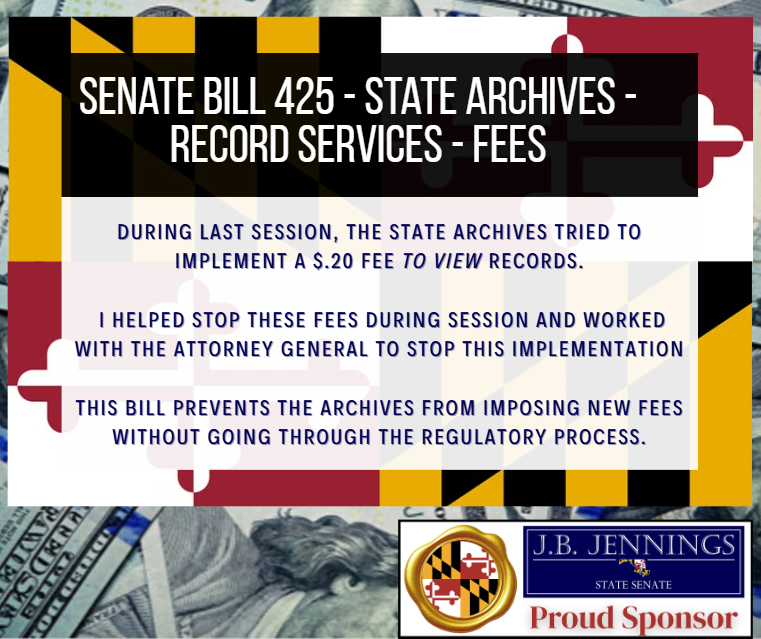
Senate Bill 425 - State Archives - Record Services - Fees
Senate Bill 425 - State Archives - Record Services - Fees prohibits the Maryland State Archives from establishing any new fees unless they go through the formal regulatory process, unless those fees are already included in the existing fee schedule. However, they would retain the authority to adjust fees currently listed without additional regulatory review.
This is particularly important given that last year there was an attempt to implement a $0.20 per-page viewing fee, which would have significantly impacted land title companies, realtors, and other businesses that rely on record access.
Ultimately, those increased costs would not stop with industry professionals, they would be passed down to Marylanders in the form of higher closing costs, service fees, and overall transaction expenses.
Sign up today by 6:00 p.m. to testify on Senate Bill 425. The hearing will be on Wednesday, February 18, 2026 at 1:00 p.m. in the Budget & Taxation Committee hearing.
-
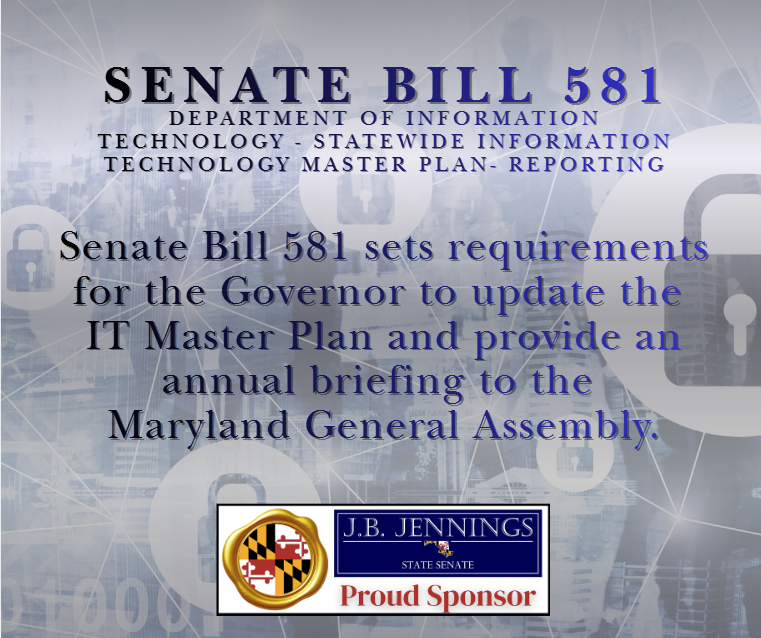
Senate Bill 581 Department of Information Technology - Statewide Information Technology Master Plan - Reporting
Senate Bill 581 - Department of Information Technology - Statewide Information Technology Master Plan - Reporting requires the Department of Information Technology to update its IT Master Plan within one year of each Gubernatorial term and to provide an annual briefing to the Maryland General Assembly.
Sign up on Tuesday, February 17, 2026 by 6:00 p.m., to testify on Thursday, February 19, 2026 at 1:00 p.m. in Education, Energy, and the Environment Committee hearing.

